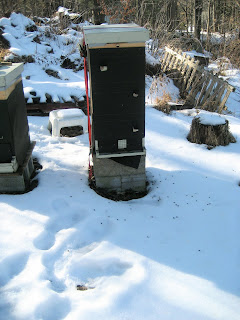

On oddly warm winter days, beekeepers check on their hives. Martin Luther King day I went up and saw signs that my taller hive (the house hive) was doing great. Lots of poop in the snow out in front of the hive (they hold it in while they are in the hive and take advantage of the warm weather to relieve themselves, and what relief it must be....) about three dozen dead bees scattered in the snow, cleared out from inside of the hive. The observation board had plenty of fresh cappings, letting me know where the cluster was in the hive. When I looked in with my flashlight, I got to see the most beautiful cluster, from one side of the frames to the other. It was the first time that I have seen a winter cluster! The sphere of bees widened as I scanned from the outer edge of the hive to the center, and then narrowed again as I reached the other side. When I put my ear to the outside of the hive, I heard a pleasant and reassuring hum. Plenty of stores left, with the top super still full of capped honey. The other hive however, had none of the outer signs of inner life. No bee poop or dead bees out in front of the hive, no cappings on the observation board, and some strange leaking of honey taking place. My fears were confirmed when I looked in with my flashlight. All I could see when I peered down between the frames were loads of seemingly dead bees at the bottom of the hive. No signs of an intruder. Plenty of stores. It will remain a mystery until I take the hive apart. Today, with temperatures going into the mid 50s, I again saw signs of life in front of the house hive, with bees even braving the rain, but nothing stirring from the woods hive. Although I am fairly convinced that the hive is dead, I find myself reluctant to go in there quite yet. I want to make sure that I do so before robbing, mildew or pests get a hold of it though. At that point I can look for signs of disease or starvation.
I am sad, and will be even sadder when I have to clear out the thousands of dead bees that I suspect are in there, but I know that this is part of the process. I have heard that typically, one out of four hives don't make it through the winter, so really I have been lucky so far.
I miss my girls. I miss their smell and the feel of them landing on my hands to check me out.
Next month, the queen will start laying eggs. Slowly at first, just enough to produce enough nurse bees to take care of the burst of young that will arrive when the weather warms with the arrival of spring. I am often awestruck by the realization that they know, on some intuitive level exactly what they need to be doing now, with the anticipation of what is to come. We have so much to learn.

